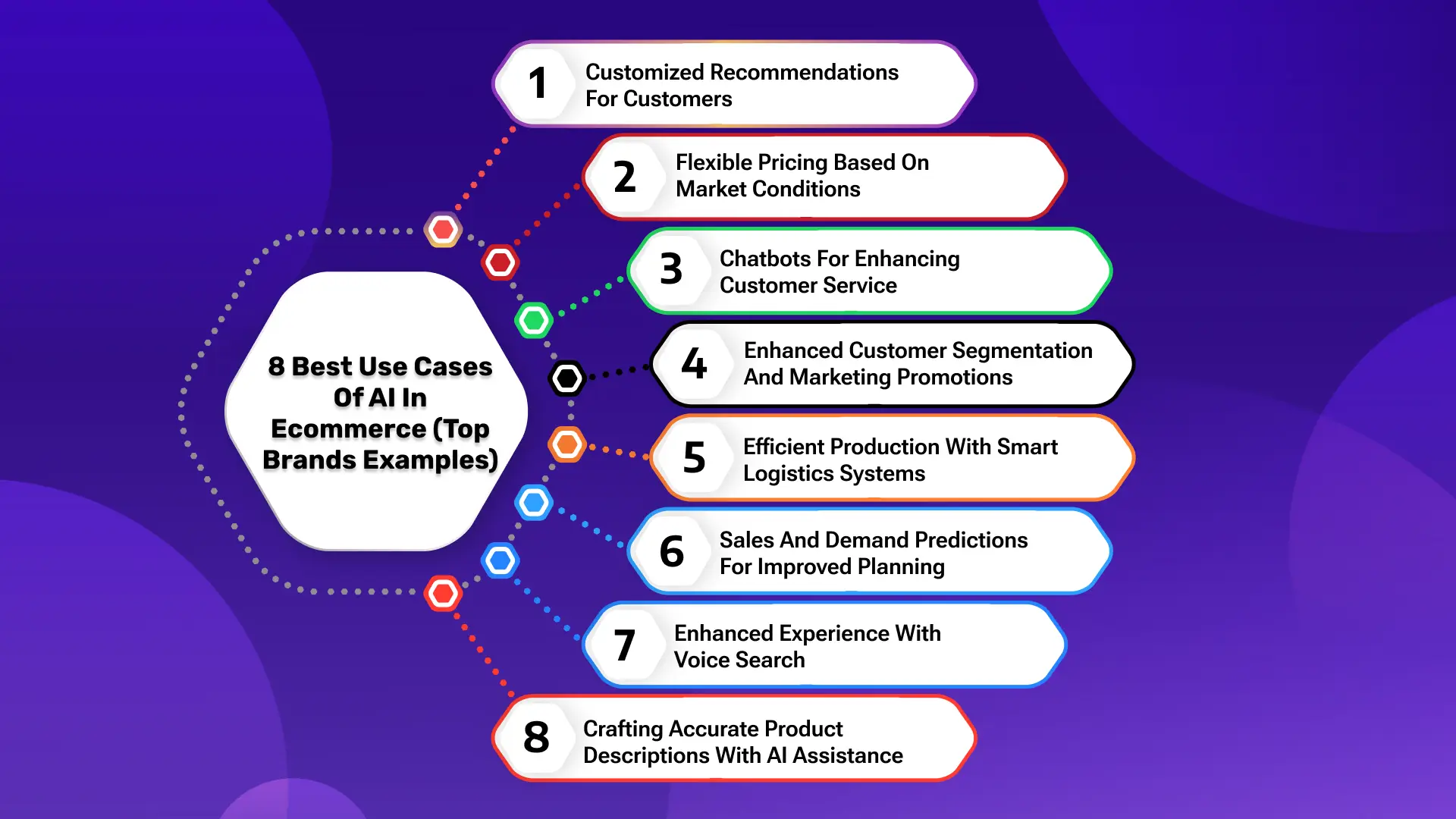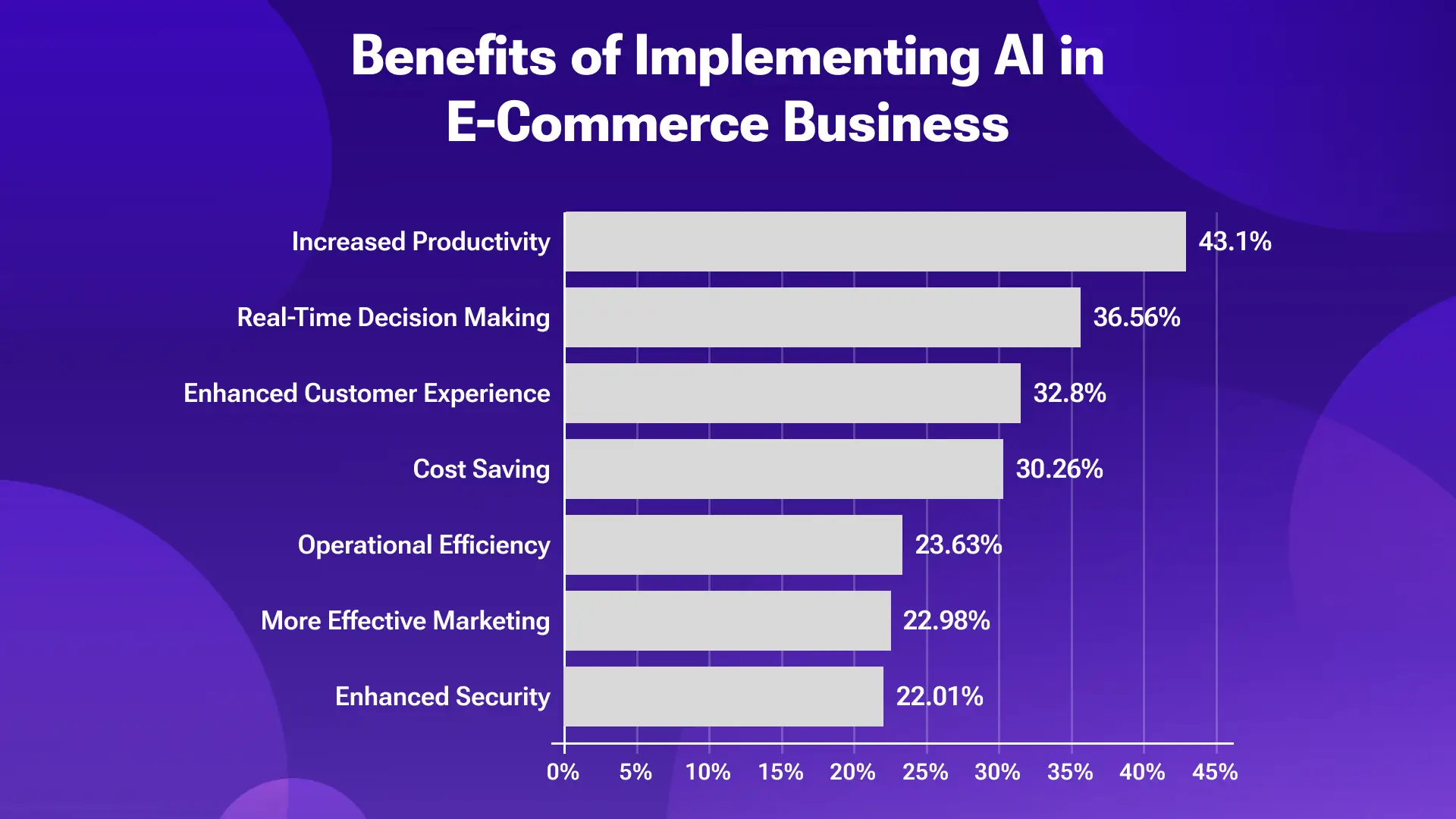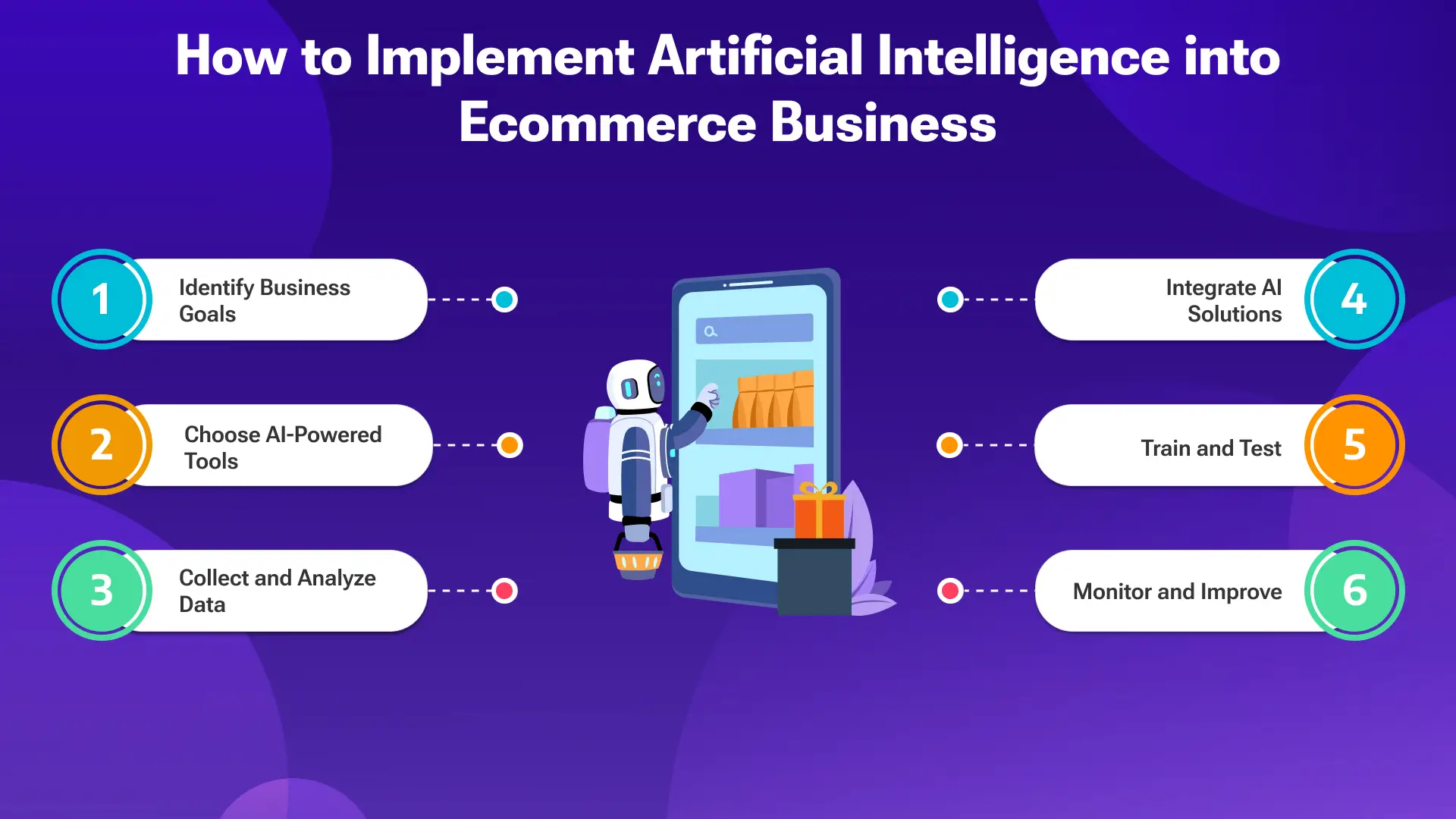In a world where online shopping has become second nature, brands are continually searching for innovative ways to enhance customer experience, streamline operations, and boost sales.
According to a report by McKinsey, eCommerce companies that adopt AI technologies increased their profitability by 20% to 30%. With AI's rapid advancement, it’s no surprise that forward-thinking e-commerce brands are leveraging their potential to gain a competitive edge.
Here are some of the most compelling AI use cases in eCommerce, illustrating how companies are transforming their operations and customer interactions.
How AI is Transforming the E‑commerce Industry?
They operate around the clock, 24/7. Let’s explore how eCommerce uses Artificial Intelligence
Shoppers can easily browse products, compare prices, and make informed choices from the comfort of their homes.
With just a few clicks, consumers can complete purchases and choose delivery options, including courier services or parcel lockers.
It’s no surprise that over two billion people now shop online, and this number continues to rise. Yet, modern shoppers have high expectations. With numerous options available, they demand seamless shopping experience.
AI-powered tools are essential in meeting these expectations, benefiting e-commerce companies of all sizes. AI is not just for large corporations; it can enhance nearly every aspect of an eCommerce business, from optimizing inventory management to personalizing customer service.
Research from Statista suggests that artificial intelligence in eCommerce has the potential to boost productivity by up to 40%. Its strength lies in analyzing extensive data, identifying patterns, and enabling strategic actions.
Additionally, 87% of businesses believe AI in eCommerce provides a significant competitive edge, according to Statista.
8 Best Use Cases of AI in E-commerce (Top Brands Examples)
Here are eight best AI use cases in eCommerce that will show how businesses maximize the power of this technology.

Customized Recommendations for Customers
One of the most important use cases of AI in eCommerce is customized product recommendations. It enables store owners to create personalized shopping experiences, making interactions more relevant to each customer. This approach not only enhances online engagement but also leads to higher conversion rates, increased average order values (AOV), and stronger customer loyalty.
Example:
Netflix’s Recommendation Engine (NRE) generates over $1 billion in annual value by curating personalized content for millions of subscribers. Using advanced algorithms, NRE filters through thousands of titles and organizes them into 1,300+ clusters based on user preferences.
By analyzing each subscriber’s viewing history and behavior, NRE provides hyper-personalized suggestions that instantly connect viewers with content they’re likely to enjoy—regardless of the number of users active on the platform.
This powerful AI-driven personalization can be applied to eCommerce industry, enabling online stores to offer customized product recommendations that improve customer experience and drive sales.
Flexible Pricing Based on Market Conditions
Another best AI use case in eCommerce is flexible pricing as per market scenarios. Setting the right price for your products involves balancing factors like competitor prices, production costs, and customer demand. This process can become challenging and time-consuming, especially for extensive inventories. AI makes it easier by automating real-time pricing adjustments based on comprehensive market data.
With AI-driven tools, you can set optimal prices by analyzing large volumes of data, including your expenses and competitor pricing. These AI-powered eCommerce support systems can even predict when to raise prices or offer discounts based on market trends and consumer behavior.
AI can be a game changer for online retailers. It automatically adjusts prices across hundreds or thousands of items, saving valuable time on manual updates. For instance, if a competitor’s stock is low, AI in eCommerce case study can help you raise prices slightly, capturing demand from customers who are willing to pay more for immediate availability.
Example:
Amazon leverages dynamic pricing by adjusting prices by up to 20% in response to competitors’ promotions or discounts. By making these adjustments gradually and factoring in sales forecasts, Amazon stays profitable while keeping its prices competitive and maintaining control over margins.
Chatbots for Enhancing Customer Service
Managing customer inquiries can quickly overwhelm support teams, especially when they need to provide prompt assistance regarding products, checkout issues, or returns. With customer expectations on the rise, a staggering 90% of customers now consider a response of ten minutes to be essential.
Implementing AI-powered chatbots on your website can significantly improve customer service while alleviating pressure on your support team. These virtual assistants are available around the clock, including weekends and holidays. They can efficiently handle routine tasks such as answering common questions, directing customers to the appropriate resources, or allowing them to leave messages and schedule callbacks.
Although chatbots aren't entirely autonomous, they can manage up to 80% of routine inquiries, freeing human agents to tackle more complex issues. Additionally, chatbots can automatically gather customer feedback by prompting users to complete brief surveys.
Example:
Zalando utilizes chatbots to enhance the customer experience and drive sales. Their chatbot serves as a virtual shopping assistant, helping users discover fashion items, offering style advice, recommending outfits, and assisting with orders.
This integration improves the overall customer experience, streamlines support, and boosts sales by providing personalized guidance throughout the shopping trip.
Enhanced Customer Segmentation and Marketing Promotions
Effective audience segmentation is crucial for personalized marketing, with 80% of consumers preferring brands that have tailor experiences. AI tools streamline this process by swiftly analyzing data to create unbiased customer segments and uncovering new audience areas. It significantly enhances marketing campaigns and potentially leads to a 760% revenue increase.
Example:
Spotify leverages AI to develop a profound understanding of each user's musical preferences, continuously adapting and refining its recommendations without relying on biases. This approach enhances customer satisfaction and illustrates how AI can create a more accurate and dynamic representation of audience segments.
Efficient Production with Smart Logistics Systems
AI-powered logistics systems significantly enhance efficiency by automating repetitive tasks and using real-time data from sensors and RFID tags. Smart warehouse shelves can detect weight and pressure, relaying this information to inventory management systems.
This technology helps maintain accurate inventory levels, preventing overspending from excess stock. Leveraging AI in eCommerce enables businesses to monitor products throughout the supply chain with integrated RFID and GPS, minimizing late deliveries and ensuring product integrity.
Example:
Amazon invests heavily in intelligent logistics, utilizing advanced technologies like RFID and smart shelves to optimize order fulfilment and streamline warehouse operations.
Sales and Demand Predictions for Improved Planning
Accurate demand forecasting is crucial for e-commerce companies to manage inventory, logistics, and pricing strategies. However, relying solely on historical sales data is required.
Many brands are now adopting artificial intelligence in the eCommerce industry to enhance forecast accuracy. Unlike traditional methods, AI incorporates real-time data, such as demographics, weather patterns, and online reviews, enabling continuous improvement in predictions through machine learning.
Example:
Danone employs a machine learning system for demand forecasting, producing more accurate estimates for short-life products. This approach enhances planning across sales, supply chain, finance, and marketing, improving operational efficiency and inventory balance while meeting service-level targets.
Enhanced Experience with Voice Search
To capitalize on this trend, e-commerce businesses must optimize their websites and product listings for voice search. This entails using natural language, focusing on long-tail keywords, and providing clear, concise answers to common questions.
As voice technology evolves, opportunities for deeper integration into the shopping experience will arise, such as personalized recommendations and voice-enabled ordering.
Example:
Sephora effectively leverages voice search by allowing Google Assistant users to shop directly from their platform. Additionally, those with Google Home can access the Skincare Advisor tool to find nearby stores, receive skincare tips, determine their skin type, and request Sephora makeup tutorials.
Increased Security with Fraud Detection
As eCommerce shifts from in-store to online purchasing, businesses face increased vulnerability to fraud due to higher transaction volumes.
AI-based fraud detection tools empower merchants to combat these threats by analyzing data and recognizing suspicious activities, such as rapid multiple orders or incomplete information.
For Example:
PayPal utilizes AI algorithms to monitor user behavior, transaction patterns, and various identification parameters. This technology not only identifies potential fraud attempts but also prevents misuse of promo codes and loyalty programs by detecting users with multiple accounts for fraudulent purchases. It continuously improves its detection capabilities through machine learning.
Crafting Accurate Product Descriptions with AI Assistance
Even seasoned copywriters find it challenging to create compelling product descriptions that are also optimized for search engines. As your product range expands, developing unique descriptions for each item can become increasingly time-consuming.
This is where AI technology comes into play. While they may not fully replicate the finesse of a professional copywriter, AI can efficiently generate engaging, unique, and optimized product descriptions based on provided specifications.
Many modern AI tools incorporate established copywriting frameworks like AIDA (Attention, Interest, Desire, Action) to craft human-like text and seamlessly integrate keywords.
For Example:
Walmart utilizes AI-driven robots to scan shelves, automatically generating product descriptions for its online store. This efficient process allows for swift and accurate updates to Walmart's online inventory, ensuring that product descriptions are informative and consistent.
By leveraging AI, Walmart aims to enhance the overall customer experience and drive sales through up-to-date and comprehensive product information.
Benefits of AI in E-Commerce
Implementing artificial intelligence in e-commerce businesses has several benefits. Each positively impacts different aspects of operations and enhances customer experiences.

Enhanced Customer Experience
AI algorithms analyze user behavior, such as browsing history and purchase patterns, to deliver personalized product recommendations. This makes it easier for customers to find what they need quickly, enhancing satisfaction, boosting conversion rates, and building customer loyalty.
Real-Time Decision Making
With AI-driven sales forecasting and demand prediction tools, businesses can leverage real-time data, demographic insights, and external factors (like weather and online reviews) to make accurate predictions. This supports timely, informed decisions and helps businesses adapt to changing market dynamics.
More Effective Marketing
Leveraging AI in eCommerce enables marketers to create precise customer segments and personalize campaigns based on analyzed data. This targeted approach enhances the relevance of promotions, improving conversion rates, ROI, and the overall effectiveness of marketing efforts.
Enhanced Security
AI-powered fraud detection tools assess user behavior, transaction patterns, and various parameters to detect and prevent fraudulent activities. This strengthens security, safeguarding both businesses and customers against potential threats.
Operational Efficiency
AI-powered tools, such as dynamic pricing systems and intelligent logistics, automate repetitive tasks and decision-making processes. This minimizes manual effort, streamlines operations, and ensures optimal resource utilization.
Cost Savings
Another benefit of using artificial intelligence in the eCommerce sector is cost saving. AI algorithms help in improving pricing strategies, preventing fraud, and automating routine tasks. These efficiencies reduce errors, enhance processes, and help businesses save costs by avoiding financial losses from fraudulent activities.
How to Implement Artificial Intelligence into E-commerce?
Here’s a step-by-step guide on how to successfully integrate AI into your e-commerce business.

Here’s a step-by-step guide on how to successfully integrate AI into your eCommerce business.
- Identify Business Goals: Start by defining your purpose for implementing artificial intelligence into your business. Whether it’s personalized recommendations, customer support, or inventory management, it’s essential to clear your objectives.
- Choose AI-Powered Tools: Research and select AI solutions suited to your goals. For example, AI-enabled chatbots can be used for 24/7 customer service or recommendation engines to personalize product suggestions.
- Collect and Analyze Data: Gather data from customer behavior, purchase history, and browsing patterns. To implement artificial intelligence into eCommerce, you need quality data to make accurate predictions, so organize and clean your data.
- Integrate AI Solutions: Implement the chosen AI tools within your website or app. For instance, natural language processing (NLP) can be used for chatbots, image recognition can be used for visual search, and machine learning algorithms can be used for dynamic pricing.
- Train and Test: Train your AI systems with existing data and run tests to fine-tune accuracy. A/B testing can help optimize performance.
- Monitor and Improve: AI requires ongoing monitoring and refinement. Use analytics to track success metrics and adjust algorithms to improve results and adapt to changing customer preferences.
These steps ensure a strategic approach to integrating Artificial Intelligence in eCommerce, helping you maximize value and efficiency.
As you are now aware of AI use cases in eCommerce industry, it’s time to find the best development partner to integrate AI technology in online shopping.
Contact VLink's Experts to Integrate AI into your E-commerce System!
Ready to take your e-commerce business to the next level? VLink's team of experts is here to help you seamlessly integrate AI solutions tailored to your unique needs.
Whether you’re looking to improve customer experiences, optimize operations, or boost sales, our specialized services will guide you.
Reach out to us today and unlock the full potential of AI in your e-commerce system!









 Shivisha Patel
Shivisha Patel

















